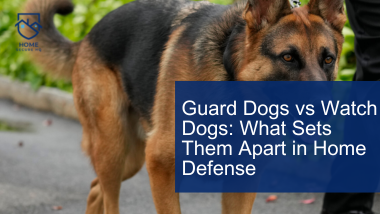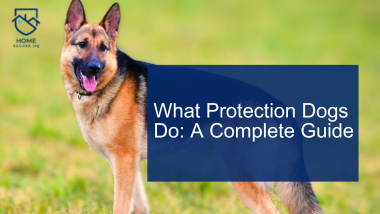Regarding guard dogs, breeds like German Shepherds or Rottweilers might come to mind. However, many dog lovers wonder if Bull Terriers, with their iconic egg-shaped heads and muscular builds, have what it takes to protect their families.
Are Bull Terriers Good Guard Dogs? This question is mostly asked by dog enthusiasts who want to know more about bull terriers. Though Bull Terriers are strong and loyal, how do they fare as guard dogs?
Stay put as this post examines the protective instincts of Bull Terriers to determine if they have the traits to be effective in guarding roles.
The Bull Terrier’s History and Nature
Developed in the 19th century as a cross between Bulldogs and Terriers, Bull Terriers were initially bred for dogfighting a brutal sport that fortunately is now illegal.
However, because of their background, Bull Terriers retain some traits that can be useful for guarding purposes, including strength, agility, and tenacity.
Unlike German Shepherds, who were specifically bred for herding and protection, Bull Terriers weren’t initially created to protect or guard. Nevertheless, their powerful build and determined nature can make them a deterrent to intruders simply by appearance.
Moreover, their loyal and affectionate personality often compels them to stick close to their families, adding a level of protection through their companionship.
The Protective Instinct: Do Bull Terriers Have It?
Bull Terriers are famously loyal, and loyalty is an essential trait for any dog considered for guarding. This breed tends to form strong bonds with their human families, often displaying a protective attitude.
While they may not have a traditional “guarding instinct” like some breeds, they are naturally watchful and alert to their surroundings.
For example, a Bull Terrier might not immediately jump to bark at a stranger approaching the door. However, if they sense their owner’s unease, they can react defensively.
In this sense, Bull Terriers have a protective nature that surfaces when they feel their family could be threatened.
Moreover, they are known for their intelligence and can often distinguish between friends and strangers, making them situationally aware, a valuable trait for any potential guard dog.
Alertness and Loyalty: Key Traits for Guard
When it comes to a dog’s role in guarding, alertness is paramount. Many Bull Terrier owners find that while their dogs may not bark excessively, they’re typically attentive to unusual sounds or movements.
Unlike breeds that bark at every passing noise, Bull Terriers are more discerning, which can make them more effective at alerting owners to genuine threats.
Additionally, their loyalty is profound. Bull Terriers are known to be fiercely loyal to their families, a characteristic that lends itself well to protective behavior.
For instance, a Bull Terrier will often place itself between its family and a perceived threat, showing bravery even if they don’t have the same instincts as traditional guard dogs.
This loyalty, combined with their physical presence, makes them an imposing figure and can be a strong deterrent for intruders.
Physical Presence: Strength and Size as Deterrents
In terms of physical traits, Bull Terriers possess a sturdy, muscular build that can make a strong impression. Though they aren’t as large as some of the classic guard dog breeds, their athletic appearance and powerful jaws give them a formidable presence.
An intruder unfamiliar with dog breeds might think twice before approaching a house guarded by a Bull Terrier simply due to its intimidating look.
Moreover, Bull Terriers are agile and fast, meaning they could potentially intercept someone entering the home uninvited. While they might not have the sheer size of a Rottweiler, their combination of speed and muscularity can make them appear tough and ready for action.
As a result, their physical presence alone can be a visual deterrent, adding an extra layer of security.
Training for Guarding: Can Bull Terriers Be Trained to Guard?
Training is essential for any dog intended for guard duty, and Bull Terriers are no exception. While they are intelligent, Bull Terriers are also known for their independence and occasional stubbornness.
This means they can sometimes resist training or decide to do things their own way. However, with consistent, positive reinforcement, Bull Terriers can learn basic guard dog behaviors, such as alerting their owners to unfamiliar people or sounds.
For example, some owners find that their Bull Terriers respond well to boundary training, where the dog learns which areas are “safe zones” and which require attention.
However, it’s crucial to note that Bull Terriers might not be as receptive to advanced guard training. While they can certainly alert owners to potential threats, they aren’t likely to respond to commands with the precision of a German Shepherd.
Thus, owners should be patient and realistic about what their Bull Terrier can achieve in terms of guarding duties.
Socialization: Ensuring a Balanced, Protective Companion
Socialization is another key factor in whether a Bull Terrier can be a good guard dog. A well-socialized Bull Terrier is more likely to be protective without being overly aggressive or fearful.
Exposing a Bull Terrier to various people, places, and situations from a young age helps them learn when to be cautious and when to relax.
Furthermore, socialization helps Bull Terriers differentiate between normal visitors and potentially harmful strangers.
For example, if a Bull Terrier is frequently exposed to friends and family visiting the home, they can learn to distinguish between safe visitors and unfamiliar faces.
A well-socialized Bull Terrier is less likely to react aggressively out of fear or confusion and more likely to respond appropriately to unusual or threatening situations.
What Type of Guarding Can You Expect from a Bull Terrier?
While Bull Terriers aren’t as predictable as traditional guard dogs, they can offer a certain level of protection by alerting owners to unusual occurrences and being watchful over family members.
In addition, their appearance and presence can act as a deterrent, even if they aren’t actively trained to guard.
However, it’s essential to be realistic Bull Terriers are not attack dogs, nor do they have the innate herding or protective instincts of some other breeds.
Nevertheless, they can still serve as excellent companions who are alert, observant, and above all loyal. Their “guarding” style may not fit the typical mold, but it can provide a unique form of security, especially in combination with other home safety measures.
Are Bull Terriers Right for Your Home?
If you’re considering a Bull Terrier for their protective instincts, think about what you need in a guard dog. If you’re seeking a dog that will instinctively guard with minimal training, a Bull Terrier may not be the ideal choice.
However, if you’re looking for a loyal, watchful dog who will alert you to changes in the environment and offer a deterrent through presence alone, a Bull Terrier could be a great fit.
Furthermore, keep in mind that Bull Terriers are high-energy dogs that require plenty of exercise, mental stimulation, and affection.
Their primary strength lies in their devotion to their families, so a Bull Terrier would be ideal for owners who are as committed to them as they are to their homes.
Conclusion
Bull Terriers may not be traditional guard dogs, but they bring a unique blend of loyalty, alertness, and presence that can contribute to a sense of security.
They may not match breeds that are specially trained for guarding, but Bull Terriers offer protection in their own way. For those who value a devoted, attentive companion that’s both a loving pet and a watchful presence, Bull Terriers can be a fantastic choice.








2 comments
Normally I don’t read article on blogs, but I would like to say that this write-up very forced me to try and do it! Your writing style has been surprised me. Thanks, very nice post.
Thank you soo much
Comments are closed.